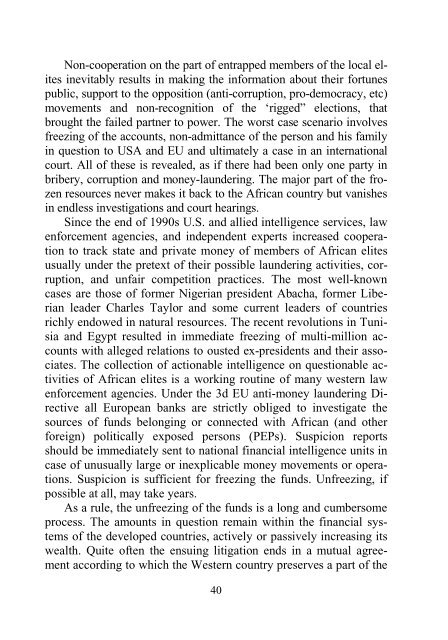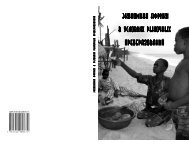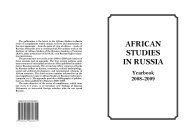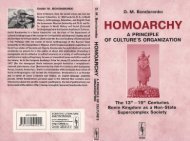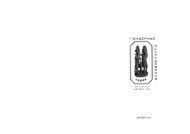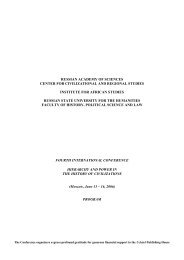L. Fituni, I. Abramova Resource Potential of Africa and Russia's ...
L. Fituni, I. Abramova Resource Potential of Africa and Russia's ...
L. Fituni, I. Abramova Resource Potential of Africa and Russia's ...
Create successful ePaper yourself
Turn your PDF publications into a flip-book with our unique Google optimized e-Paper software.
Non-cooperation on the part <strong>of</strong> entrapped members <strong>of</strong> the local elites<br />
inevitably results in making the information about their fortunes<br />
public, support to the opposition (anti-corruption, pro-democracy, etc)<br />
movements <strong>and</strong> non-recognition <strong>of</strong> the ‘rigged” elections, that<br />
brought the failed partner to power. The worst case scenario involves<br />
freezing <strong>of</strong> the accounts, non-admittance <strong>of</strong> the person <strong>and</strong> his family<br />
in question to USA <strong>and</strong> EU <strong>and</strong> ultimately a case in an international<br />
court. All <strong>of</strong> these is revealed, as if there had been only one party in<br />
bribery, corruption <strong>and</strong> money-laundering. The major part <strong>of</strong> the frozen<br />
resources never makes it back to the <strong>Africa</strong>n country but vanishes<br />
in endless investigations <strong>and</strong> court hearings.<br />
Since the end <strong>of</strong> 1990s U.S. <strong>and</strong> allied intelligence services, law<br />
enforcement agencies, <strong>and</strong> independent experts increased cooperation<br />
to track state <strong>and</strong> private money <strong>of</strong> members <strong>of</strong> <strong>Africa</strong>n elites<br />
usually under the pretext <strong>of</strong> their possible laundering activities, corruption,<br />
<strong>and</strong> unfair competition practices. The most well-known<br />
cases are those <strong>of</strong> former Nigerian president Abacha, former Liberian<br />
leader Charles Taylor <strong>and</strong> some current leaders <strong>of</strong> countries<br />
richly endowed in natural resources. The recent revolutions in Tunisia<br />
<strong>and</strong> Egypt resulted in immediate freezing <strong>of</strong> multi-million accounts<br />
with alleged relations to ousted ex-presidents <strong>and</strong> their associates.<br />
The collection <strong>of</strong> actionable intelligence on questionable activities<br />
<strong>of</strong> <strong>Africa</strong>n elites is a working routine <strong>of</strong> many western law<br />
enforcement agencies. Under the 3d EU anti-money laundering Directive<br />
all European banks are strictly obliged to investigate the<br />
sources <strong>of</strong> funds belonging or connected with <strong>Africa</strong>n (<strong>and</strong> other<br />
foreign) politically exposed persons (PEPs). Suspicion reports<br />
should be immediately sent to national financial intelligence units in<br />
case <strong>of</strong> unusually large or inexplicable money movements or operations.<br />
Suspicion is sufficient for freezing the funds. Unfreezing, if<br />
possible at all, may take years.<br />
As a rule, the unfreezing <strong>of</strong> the funds is a long <strong>and</strong> cumbersome<br />
process. The amounts in question remain within the financial systems<br />
<strong>of</strong> the developed countries, actively or passively increasing its<br />
wealth. Quite <strong>of</strong>ten the ensuing litigation ends in a mutual agreement<br />
according to which the Western country preserves a part <strong>of</strong> the<br />
40


